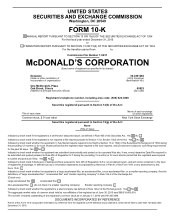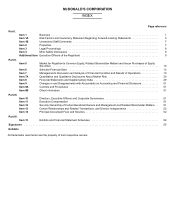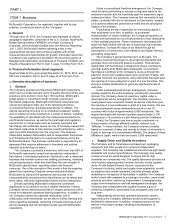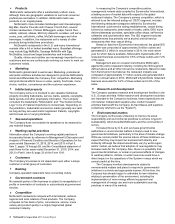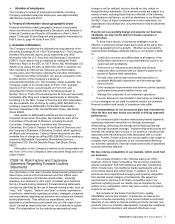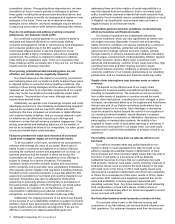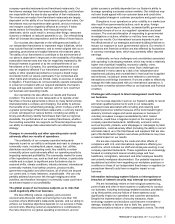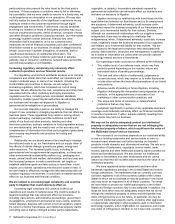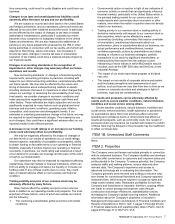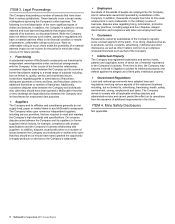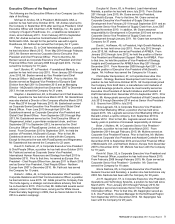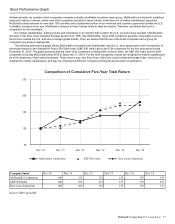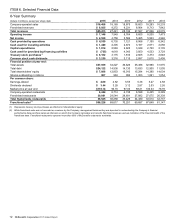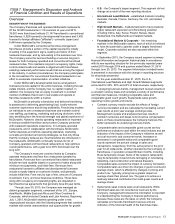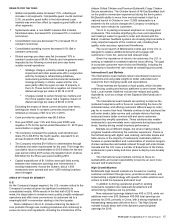McDonalds 2015 Annual Report Download - page 7
Download and view the complete annual report
Please find page 7 of the 2015 McDonalds annual report below. You can navigate through the pages in the report by either clicking on the pages listed below, or by using the keyword search tool below to find specific information within the annual report.McDonald's Corporation 2015 Annual Report 5
company-operated restaurants and franchised restaurants. Our
franchisees manage their businesses independently, and therefore
are responsible for the day-to-day operation of their restaurants.
The revenues we realize from franchised restaurants are largely
dependent on the ability of our franchisees to grow their sales. Our
franchisees may not experience sales growth, and our revenues
and margins could be negatively affected as a result. If sales
trends worsen for franchisees, their financial results may
deteriorate, which could result in, among other things, restaurant
closures or delayed or reduced payments to us. Our refranchising
effort will increase that dependence and the effect of those factors.
Our success also depends on the willingness and ability of
our independent franchisees to implement major initiatives, which
may include financial investment, and to remain aligned with us on
operating, promotional and capital-intensive reinvestment plans.
The ability of our franchisees to contribute to the achievement of
our plans is dependent in large part on the availability of funding at
reasonable interest rates and may be negatively impacted by the
financial markets in general or by the creditworthiness of our
franchisees or the Company. Our operating performance could
also be negatively affected if our franchisees experience food
safety or other operational problems or project a brand image
inconsistent with our values, particularly if our contractual and
other rights and remedies are limited, costly to exercise or subject
to litigation. If franchisees do not successfully operate restaurants
in a manner consistent with our required standards, the brand’s
image and reputation could be harmed, which in turn could hurt
our business and operating results.
Our ownership mix also affects our results and financial
condition. The decision to own restaurants or to operate under
franchise or license agreements is driven by many factors whose
interrelationship is complex and changing. Our ability to achieve
the benefits of our refranchising strategy, which involves a shift to
a greater percentage of franchised restaurants, in a timely manner
or at all, will depend on various factors, including our ability to
timely and effectively identify franchisees that meet our rigorous
standards, the performance of our existing franchisees, whether
the resulting ownership mix supports our financial objectives and
our ability to manage risks associated with our refranchising
strategy.
Changes in commodity and other operating costs could
adversely affect our results of operations.
The profitability of our company-operated restaurants
depends in part on our ability to anticipate and react to changes in
commodity costs, including food, paper, supply, fuel, utilities,
distribution and other operating costs. Any volatility in certain
commodity prices could adversely affect our operating results by
impacting restaurant profitability. The commodity market for some
of the ingredients we use, such as beef and chicken, is particularly
volatile and is subject to significant price fluctuations due to
seasonal shifts, climate conditions, industry demand, international
commodity markets, food safety concerns, product recalls,
government regulation and other factors, all of which are beyond
our control and, in many instances, unpredictable. We can only
partially address future price risk through hedging and other
activities, and therefore increases in commodity costs could have
an adverse impact on our profitability.
The global scope of our business subjects us to risks that
could negatively affect our business.
We face differing cultural, regulatory and economic
environments that exist within and among the more than 100
countries where McDonald’s restaurants operate, and our ability to
achieve our business objectives depends on our success in these
environments. Meeting customer expectations is complicated by
the risks inherent in our global operating environment, and our
global success is partially dependent on our System’s ability to
leverage operating successes across markets. Our initiatives may
not have broad appeal with our customer base and could drive
unanticipated changes in customer perceptions and guest counts.
Disruptions in our operations or price volatility in a market can
also result from governmental actions, such as price, foreign
exchange or import-export controls, increased tariffs, government-
mandated closure of our or our suppliers’ operations and asset
seizures. The cost and disruption of responding to governmental
investigations or actions, whether or not they have merit, may
impact our results. Our international success depends in part on
the effectiveness of our strategies and brand-building initiatives to
reduce our exposure to such governmental actions. Our results of
operations and financial condition are also affected by fluctuations
in currency exchange rates, which may adversely affect reported
earnings.
Additionally, we face challenges and uncertainties associated
with operating in developing markets, which may entail a relatively
higher risk of political instability, economic volatility, crime,
corruption and social and ethnic unrest. Such challenges are
exacerbated in many cases by a lack of an independent and
experienced judiciary and uncertainties in how local law is applied
and enforced, including in areas most relevant to commercial
transactions and foreign investment. If we are unable to effectively
manage the risks associated with our international operations, it
could have a material adverse effect on our business and financial
condition.
Challenges with respect to talent management could harm
our business.
Our success depends in part on our System’s ability to recruit
and retain qualified personnel to work in our restaurants.
Increased costs associated with recruiting and retaining such
qualified personnel, whether because of the trend toward higher
statutory minimum wages and social expenses or because of
voluntary increases in wages necessitated by labor market
conditions, could have a negative impact on the margins of our
company-operated restaurants. Additionally, economic action,
such as boycotts, protests, work stoppages or campaigns by labor
organizations, could adversely affect (including the ability to recruit
and retain talent) us or the franchisees and suppliers that are also
part of the McDonald’s System and whose performance may have
a material impact on our results.
We are also impacted by the costs and other effects of
compliance with U.S. and international regulations affecting our
workforce, which includes our staff and employees working in our
company-operated restaurants. These regulations are increasingly
focused on employment issues including wage and hour,
healthcare, immigration, retirement and other employee benefits
and unlawful workplace discrimination. Our potential exposure to
reputational and other harm regarding our workplace practices or
conditions or those of our independent franchisees or suppliers (or
perceptions thereof) could have a negative impact on our
business.
Information technology system failures or interruptions or
breaches of network security may interrupt our operations.
We are increasingly reliant on technological systems (e.g.,
point-of-sale and other in-store systems or platforms) to conduct
our business, including technology-enabled solutions provided to
us by third parties; and any failure of these systems could
significantly impact our operations and customer perceptions.
Despite the implementation of security measures, those
technology systems and solutions could become vulnerable to
damage, disability or failures due to theft, fire, power loss,
telecommunications failure or other catastrophic events. The third

